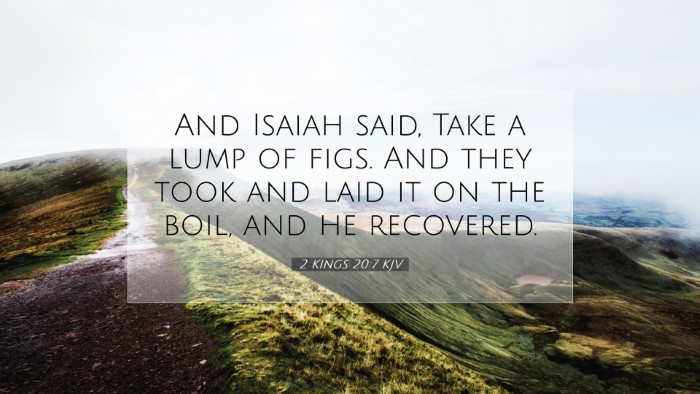Old Testament
Genesis Exodus Leviticus Numbers Deuteronomy Joshua Judges Ruth 1 Samuel 2 Samuel 1 Kings 2 Kings 1 Chronicles 2 Chronicles Ezra Nehemiah Esther Job Psalms Proverbs Ecclesiastes Song of Solomon Isaiah Jeremiah Lamentations Ezekiel Daniel Hosea Joel Amos Obadiah Jonah Micah Nahum Habakkuk Zephaniah Haggai Zechariah Malachi2 Kings 20:7
2 Kings 20:7 KJV
And Isaiah said, Take a lump of figs. And they took and laid it on the boil, and he recovered.
2 Kings 20:7 Bible Commentary
Commentary on 2 Kings 20:7
2 Kings 20:7 states:
"And Isaiah said, Take a lump of figs. And they took and laid it on the boil, and he recovered."
Introduction
This passage narrates a significant moment in King Hezekiah's life. Facing a dire illness, Hezekiah receives a message from the prophet Isaiah, which leads to a miraculous recovery through a seemingly simple remedy of figs. This commentary seeks to explore the multifaceted implications of this event, examining the theological, spiritual, and practical dimensions present in the text.
The Context of Hezekiah’s Illness
Hezekiah was a king of Judah who is known for his reforms and for returning the people to the worship of Yahweh. However, as noted by Matthew Henry, even a faithful leader can encounter trials and tribulations, which, in this case, manifested as a grave illness. This context is crucial for understanding the relationship between faith, divine healing, and human frailty.
Hezekiah’s Prayer
Before the arrival of Isaiah, Hezekiah prayed earnestly for healing. His request to God highlights the importance of prayer and reliance on God in times of distress. Clarke notes that prayer is the means of communicating needs to God, often bringing forth miraculous results. The juxtaposition of human effort and divine intervention is central to many biblical narratives.
The Role of Isaiah and God’s Message
Isaiah plays a crucial role as the prophetic voice. His prompt return with God’s message reinforces the idea of God’s immediate response to sincere prayer. Barnes highlights that God’s intervention was not only an act of mercy but also a confirmation of His covenant relationship with Israel and His promises to His faithful servants.
God’s Sovereignty and Healing
This account demonstrates God's sovereignty over life and death. The metaphor of healing through figs can be seen as a testament to God's power to use natural means for supernatural ends. Henry argues that the use of figs symbolizes the lowly and ordinary means God often employs in our lives to accomplish His purposes.
The Fig Poultice: A Symbol of Faith
The application of the fig poultice carries significant meaning. On a practical level, it indicates the intersection of faith and medical practice. Clarke asserts that while God can heal directly, He also sometimes uses natural remedies, which allows humans to participate in their own healing process. The figs represent God's provision and the act of obedience in following divine instructions, conveying an important lesson on faith.
Spiritual Restoration
Hezekiah’s recovery is not merely physical; it signifies spiritual renewal. His healing allowed him to continue his reign and pursue further reforms in Judah. Highlighting this, Barnes states that sometimes physical healing is a precursor to greater spiritual obligations and responsibilities. Hezekiah’s life post-recovery illustrates a renewed commitment to God’s commandments and the welfare of his nation.
Applications for Today
For modern readers, this narrative offers several applications:
- Prayer as a Priority: Just as Hezekiah turned to God in his time of need, believers today are encouraged to seek God earnestly in prayer, recognizing His ability to heal and restore.
- God’s Methods: The use of figs points towards the acceptance of medical means alongside faith. Christians are encouraged to seek appropriate medical help, understanding that God works through various channels.
- Faith and Obedience: Hezekiah’s story teaches the importance of acting upon God’s word and trusting in His divine timing and methods.
- Spiritual Vigilance: Hezekiah’s later commitment after recovery serves as a reminder of the responsibility that comes with restoration. Believers are called to thrive spiritually and seek to serve the community post-healing.
Conclusion
2 Kings 20:7 is a profound verse illustrating God’s mercy, the power of prayer, and the simple yet impactful means of healing through obedience and faith. Hezekiah's experience implores believers, pastors, and theologians to grasp the depth of God's engagement in human affairs and the role of divine healing in the broader context of spiritual health and community responsibility.
This passage stands as a testament to God’s continual involvement in the lives of His people, reinforcing the sacredness of prayer, the efficacy of faith, and the intricate balance between divine intervention and human action.


